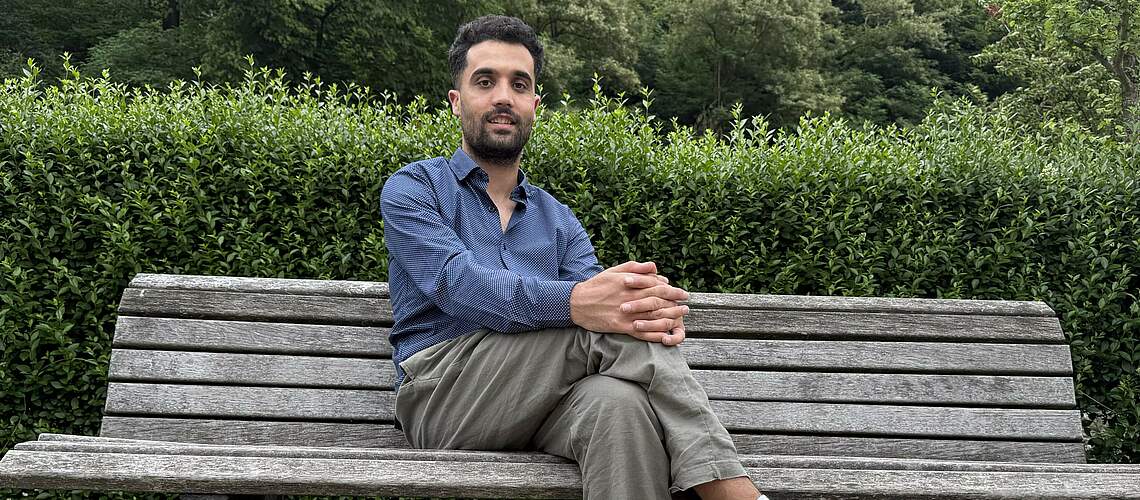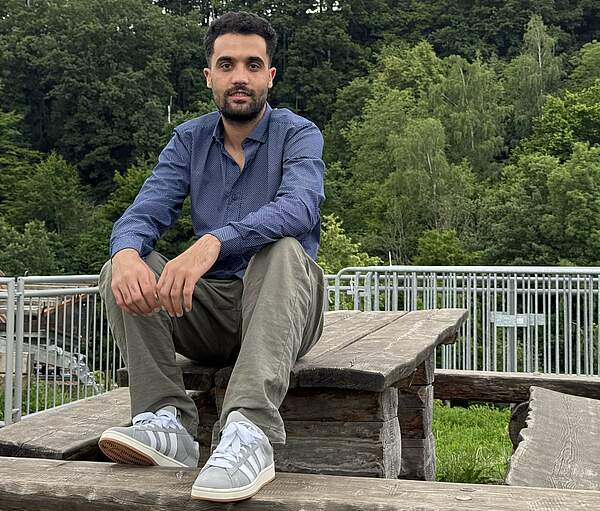
Interview with Carl Duisberg employee Omid Quraishi from Afghanistan
"First the language, then the work."
Omid came to Germany two years ago as a refugee from Afghanistan. For about a year now, he has been working as a customer advisor for German courses at the Carl Duisberg Training Center Berlin. In this interview, he talks about his experiences, challenges and hopes for the future.
1. What were your first impressions of Germany?
Everyone was very friendly, but it was very difficult for me at first because of my experiences as a refugee and my bad memories. But I was highly motivated to learn the language: I wanted to show that I wanted to build a life in Germany, to work and live here.
My residence status was unclear at first; I didn't know whether my asylum application would be approved. In the end, I received a positive decision, so I was granted a work permit as a recognised refugee.
2. How did you come to work for Carl Duisberg Centren, and what is your position at the Training Center Berlin?
I was already familiar with Carl Duisberg Centren through the integration courses. I came to the Training Center Berlin through a job advertisement for a federal voluntary service position and worked there for six months at the reception desk. At that time, I only had language level A1, so my main goal was to learn the language. I worked at the reception desk with a colleague who helped me a lot and enabled me to quickly improve my German skills.
After completing my federal voluntary service, I immediately received a job offer and have been working as a customer advisor for German courses in a permanent position since August 2024. The tasks there also fit in well with my studies in business administration (Business Administration / Management), which I completed in Afghanistan. Initially, this was not recognised in Germany, which is why I was highly motivated to learn German. My studies have now been recognised by the Standing Conference of the Ministers of Education and Cultural Affairs.
3. How do you experience working at Carl Duisberg Centren and what do you particularly like about it?
I have been very fortunate: I have great colleagues who have trained me really well and are very patient. There is a very good atmosphere in the team; everyone is very friendly and helpful.
The work is enjoyable; every week we have many international participants who attend our German courses. I empathise with the participants, as I myself have experienced how it feels to be in a foreign country without any language skills at the beginning. Our work is important; we help people to settle in Germany through language and build a future for themselves.
4. When did you start learning German?
I started from scratch almost two years ago; before that, English was the only foreign language I knew. I first completed a German integration course from the BAMF (“Bundesamt für Migration und Flüchtlinge” – Federal Office for Migration and Refugees) up to level B1, and then attended the orientation course “Living in Germany” (topics: German history, democracy, economics and politics). At the end of both courses, I had to take a final test, which I passed with “very good” grades.
I didn't take advantage of the subsequent offer for language level B2 at first because I didn't have time alongside my work. Without taking another course, I “officially” stopped learning German, but I learned German very quickly through working with colleagues, customers and agencies. I also read a lot of books at home.
I thus reached level B2 without taking a language course, so I took the B2 exam at Carl Duisberg Centren straight away.

5. What tips can you give to people learning German?
The most important thing is to learn the language first – without the language, you won't get anywhere, you won't find a flat and, above all, you won't find a good job.
Many students often don't come to class; they prefer to work straight away and earn some money (which is also possible with English), but in my opinion that's not a good idea. I recommend that everyone focus solely on the language for the first six months, and then look for a good job.
It takes a lot of effort – it's a lot of work, you have to invest a lot of time, attend classes regularly and also study a lot at home – the lessons alone are not enough. It's especially helpful to make friends and meet up with native speakers
6. What does your life in Berlin look like?
At first, it was very difficult to find a flat in Berlin, and I had to wait three to four months to be eligible to participate in an integration course, but I learned German on my own during that time. When I took the placement test for the German courses, I was able to skip two language levels.
Life in Berlin is very good and enjoyable. I live very centrally, the nightlife is great, and you can even go shopping on Sundays. Public transport is very good, even if the underground isn't always on time.
Life in Germany is nothing like life in Afghanistan; it's much better and, above all, safer. It wasn't easy, but I was very lucky: I haven't had any bad experiences so far, I've met great people, made good friends and found a good job.
7. What are your goals?
My next goal is to take the exam for the C1 certificate and become a naturalised citizen. I actually wanted to do the fast-track naturalisation after three years, but the Bundestag recently decided to abolish it, so now a minimum residence period of five years applies.
But that's okay. A stable C1 level is not easy to achieve, and now I have enough time to prepare for it. I'm already good at grammar – having taught English helped me with that – but I still lack a lot of vocabulary. My motivation is high because of my goal of becoming a citizen, and I learn quickly through my work.
I have always wanted to be well educated – if I have enough time and money, I would like to do my master's degree in Germany. There are many more subjects and opportunities in Germany than in Afghanistan. I already studied two semesters of my master's degree in Afghanistan, but then I had to leave the country.
I haven't made a final decision yet about what I'm going to do – for now, I'm continuing to learn German so that I can obtain the C1 certificate.
Thank you very much, Omid. We wish you continued success!
